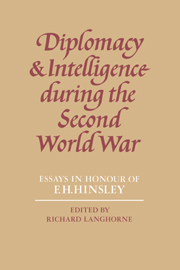Book contents
- Frontmatter
- Contents
- Contributors
- PART I
- PART II
- PART III
- 7 The political uses of military intelligence: evaluating the threat of a Jewish revolt against Britain during the Second World War
- 8 The politics of asylum, Juan Negrín and the British Government in 1940
- 9 Churchill and the British ‘Decision’ to fight on in 1940: right policy, wrong reasons
- 10 Britain and the Russian entry into the war
- 11 Crowning the revolution: the British, King Peter and the path to Tito's cave
- 12 Franklin Roosevelt and Unconditional Surrender
- PART IV
- Notes
- Bibliography of the writings of F. H. Kinsley
- Index
10 - Britain and the Russian entry into the war
Published online by Cambridge University Press: 21 September 2009
- Frontmatter
- Contents
- Contributors
- PART I
- PART II
- PART III
- 7 The political uses of military intelligence: evaluating the threat of a Jewish revolt against Britain during the Second World War
- 8 The politics of asylum, Juan Negrín and the British Government in 1940
- 9 Churchill and the British ‘Decision’ to fight on in 1940: right policy, wrong reasons
- 10 Britain and the Russian entry into the war
- 11 Crowning the revolution: the British, King Peter and the path to Tito's cave
- 12 Franklin Roosevelt and Unconditional Surrender
- PART IV
- Notes
- Bibliography of the writings of F. H. Kinsley
- Index
Summary
The divisions between the allies and Russia which emerged at the end of the war have often been seen in retrospect as responsible for the nature of Europe's ultimate political settlement. But these divisions can not be properly understood in the context of the last years of the war alone. They had their origins in the differences which arose when Hitler attacked Russia on 21 June 1941 and the Soviet Union became Britain's only fighting ally; and they existed not only between Britain and her new ally, but between the British leaders themselves, both civil and military. What were the true interests of Britain, and how were they to be reconciled with Russian demands?
For some weeks prior to the attack the British and the Russians had been aware that German troops had been concentrating near the Soviet frontier. But the Russians had publicly refused to concede that Hitler had any sinister intention. Maisky, the ambassador in London, had found it ‘hard to believe that Germany contemplated … military action’. He insisted that relations with Germany were ‘governed by the non-aggression agreement of 1939’ and that his government felt ‘no anxiety about these concentrations’. He ‘felt sure’ that Britain ‘exaggerated’ them, did not ‘believe in the possibility of attack’, and, as far as he admitted the concentrations, regarded them ‘as part of a war of nerves’.
- Type
- Chapter
- Information
- Diplomacy and Intelligence During the Second World WarEssays in Honour of F. H. Hinsley, pp. 168 - 183Publisher: Cambridge University PressPrint publication year: 1985
- 1
- Cited by



